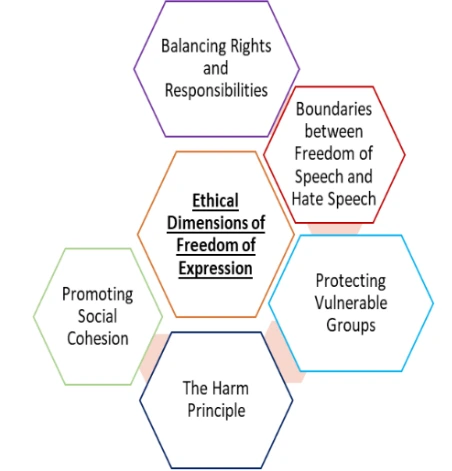Answer:
|
How to approach the question
- Introduction
- Define freedom of expression as a fundamental right.
- Body
- Describe the various ethical dimensions of freedom of expression including the boundaries between freedom of speech and hate speech, and the responsibilities associated with it.
- Mention the various loopholes.
- Give a way forward.
- Conclusion
- Conclude on a positive note.
|
Introduction:
Freedom of expression is a fundamental right under Article 19(1)(a) of the Indian Constitution which allows the unrestricted expression of thoughts, opinions, ideas, beliefs, and views through various mediums.
Body:
Ethical Dimensions of Freedom of Expression:
- Balancing Rights and Responsibilities: Ethical freedom of expression requires responsible exercise, considering impact on others. Article 19(2) sets reasonable restrictions, including on hate speech, to preserve social harmony and protect individual rights.
 Boundaries between Freedom of Speech and Hate Speech: Ethical considerations arise in defining these boundaries. India’s IPC criminalizes hate speech under Sections 153A, 153B, 295A, and 505, prohibiting enmity-promoting speech based on religion, race, caste, or community.
Boundaries between Freedom of Speech and Hate Speech: Ethical considerations arise in defining these boundaries. India’s IPC criminalizes hate speech under Sections 153A, 153B, 295A, and 505, prohibiting enmity-promoting speech based on religion, race, caste, or community.- Protecting Vulnerable Groups: India’s law, like the Scheduled Castes and Scheduled Tribes (Prevention of Atrocities) Act, safeguards marginalized communities by providing legal protection against hate speech and discrimination, ensuring their safety and well-being.
- The Harm Principle: In India, hate speech is restricted under legal provisions (like IPC), considering its potential to cause harm, maintain public order, and protect the rights and safety of individuals and communities.
- Promoting Social Cohesion: Ethical dimensions involve fostering unity through respectful dialogue. Initiatives like India’s National Integration Council address hate speech, communal tensions, and promote understanding among diverse communities.
Loopholes
- Ambiguity in Defining Hate Speech: Defining hate speech is ambiguous, leading to subjective interpretations and enforcement loopholes.
- Online Platforms and Cyber Hate: Regulating hate speech in the digital realm poses challenges as it transcends national borders, making it difficult to address within a specific legal framework.
- Balancing freedom and censor: is complex, as countering hate speech can inadvertently suppress valid dissent and diverse opinions.
- Political Interference: Ethical concerns arise when hate speech is employed as a political strategy, exploiting loopholes and power dynamics to magnify divisive rhetoric for personal or political advantages.
Way Forward:
- Strengthen Legal Frameworks: to effectively address evolving forms of hate speech and ensure their robust enforcement.
- Encourage open and respectful dialogue: among diverse communities to cultivate empathy, tolerance, and an inclusive society that values both freedom of expression and rejects hate speech.
- Work closely with online platforms and social media companies: to develop effective mechanisms for promoting responsible content moderation practices.
- Engage in international collaborations and knowledge-sharing: to combat hate speech globally.
Conclusion:
Balancing freedom and responsibility, the Indian Constitution’s guarantee of freedom of expression paves the way for a hopeful future where open dialogue and inclusive discourse flourish while hate speech is appropriately curtailed.
To get PDF version, Please click on "Print PDF" button.
 Boundaries between Freedom of Speech and Hate Speech: Ethical considerations arise in defining these boundaries. India’s IPC criminalizes hate speech under Sections 153A, 153B, 295A, and 505, prohibiting enmity-promoting speech based on religion, race, caste, or community.
Boundaries between Freedom of Speech and Hate Speech: Ethical considerations arise in defining these boundaries. India’s IPC criminalizes hate speech under Sections 153A, 153B, 295A, and 505, prohibiting enmity-promoting speech based on religion, race, caste, or community.
https://uploads.disquscdn.com/images/77f99a44fd73b926539d729de7881f0a6529feab2186f4d3fddf37e70dff9ba0.jpg https://uploads.disquscdn.com/images/9066a55d73b7d6838c3627ae397fcd62e6bda739a16d08bc149f8c8e6daab136.jpg https://uploads.disquscdn.com/images/77f99a44fd73b926539d729de7881f0a6529feab2186f4d3fddf37e70dff9ba0.jpg